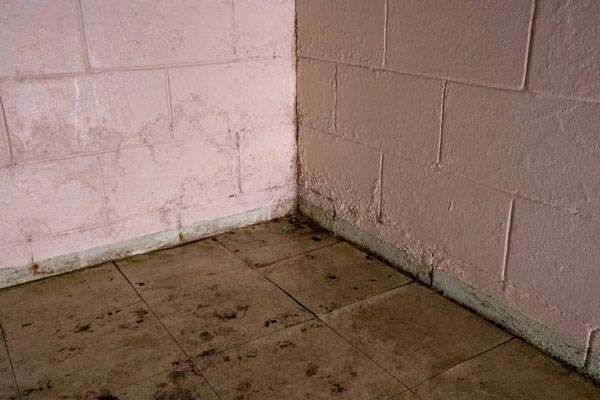Basement flooding can damage your stored belongings, compromise your home’s structural integrity, and indicate that your foundation has a problem you need to address. As such, if you own a house or commercial building with a basement, you should take some time to learn about basement flooding, its causes, and how you can prevent it from happening.
In this article, we’ll cover a few of the main reasons why basements become flooded and explore the significant damage basement flooding can cause. We’ll also touch on a few preventative measures you can take to ensure basement flooding is not an issue for you.
Why Are Basements Prone to Flooding?
Before we dive into the specific causes of basement flooding, let’s pause a moment to consider why basements tend to be the area of a home or building that is most susceptible to flooding.
Thanks to the force of gravity, water always flows towards the lowest point it can access regardless of its source–and since a basement is the lowest level of a building, it is only natural that this is the floor where you are most likely to find standing water.
Knowledgeable construction crews are well aware of this phenomenon, which is why they often install subsurface drainage systems and implement other measures to reduce the risk of basement flooding. However, even when those measures are in place, basement flooding can still occur. The next section will reveal the top reasons why that’s the case.

Primary Causes of Basement Flooding
There are many reasons why a basement can become flooded, but some are far more common than others. The sections below will detail the primary causes of basement flooding.
Surface Water Flooding
The first common cause of basement flooding relates to surface-level flooding. This type of flooding typically occurs after heavy precipitation or a significant amount of snowmelt. These scenarios result in an extraordinary amount of water moving across the ground’s surface.
Even when drainage systems are in place, high volumes of surface runoff can still result in water in your basement. Surface water is especially likely to cause flooding in your basement if the ground outside your building is improperly graded, causing a pitch toward your foundation.
Subsurface Water Flooding
The next cause of basement flooding happens underground. The soil below the ground’s surface often holds a considerable amount of water. The combined weight of the soil and the water creates hydrostatic pressure that presses against the outside of your foundation.
Over time, hydrostatic pressure can cause damage, often in the form of cracks in your foundation wall. However, even if it does not damage your foundation directly, the water pressing against your foundation can eventually seep through your basement walls due to the fact that concrete is somewhat porous and that some hairline cracks are essentially invisible to the naked eye.
Sewer Backups
In many instances, a flooded basement is not the result of water coming into your basement from outside. Instead, faults in the sewer system can be just as likely to cause basement flooding.
Damage and blockages in your sewer system can result in backups that eventually cause the water and sewage to rise into your basement. These types of basement flooding are not only damaging to your stored items and foundation, but they can also pose a health risk.
Foundation Cracks
Here, we have arrived at one of the most obvious causes of basement flooding. If your foundation has cracks or gaps in it, then it should be no surprise that groundwater can find its way in.
At times, foundation cracks result from the hydrostatic pressure we mentioned earlier. However, they can also occur as the result of settling or other factors. Regardless of the cause of your foundation cracks, each one makes it easier for water to get in.
Improper Exterior Grading
The slope of the land directly surrounding your house plays an important role in preventing basement flooding. Ideally, the land around your foundation should have a distinct slope away from your home.
If the land is flat, or it slopes towards your home, then any water that falls on it will pool and flow towards the basement. Fortunately, corrective grading measures can quickly fix this issue if it is the sole source of your basement flooding.
Leaking Windows
Many basements include windows and window wells at (or just below) the ground level. These features are excellent for letting some light into a subterranean living space–but they can let unwanted water in as well.
As houses settle, basement windows can easily come out of alignment, creating gaps that water can flow through. Faulty window wells can also lead to basement flooding since their shapes often allow water to pool.
Drainage System Damage
The final common cause of basement flooding is damage to your drainage system. Even if the team that built your house did an admirable job of designing and installing drainage, those features can eventually fail over time.
Whether a blockage occurs or there is direct damage to your drainage system, basement flooding is likely to take place soon after. Unfortunately, since many features of a basement drainage system are below the ground, it can be difficult to immediately notice when they have failed.
Damage Caused by Basement Flooding
Now that you know some of the leading causes of basement flooding, it is time for you to know the reason why it is so detrimental. The items in the list below are just a few examples of damage that flooding in your basement can cause:
- Ruined stored belongings
- Growth of mold and mildew
- Damage to furniture, carpets, and appliances
- Stress on your foundation
The list above provides just a few examples of flood-related damage that can occur in your basement. Since there are countless other detrimental effects basement flooding can have, it’s important to learn how to prevent flooding from happening in your home.
How to Prevent Future Basement Flooding
Although basement flooding is a common issue that many homeowners face, you’ll be pleased to know there are plenty of preventative measures you can take to reduce the risk of basement flooding. Below are a few of the best methods for flood prevention in your basement:
- Basement waterproofing: Comprehensive basement waterproofing services are among the best ways to dramatically reduce the risk of basement flooding.
- General foundation repair: If your foundation has cracks or gaps, repairing those issues is likely the best way to resolve and prevent flooding issues as well.
- Replacement of windows and other fixtures: If you determine that ill-fitted windows are the source of your basement flooding, the best approach is to repair or replace them.
- Corrective grading: If the land around your home slopes towards your foundation, correct the pitch as soon as possible to eliminate this common cause of basement flooding.
- Drainage system repair or installation: If your basement drainage system is broken or nonexistent, it’s time to enhance it to make your basement better capable of handling surface and subsurface runoff.
Hire the Right Team to Fix Your Flooded Basement
One of the best steps you can take to prevent basement flooding is to hire a team that has specialty expertise on the subject. At Regional Foundation & Crawl Space Repair, we have been preventing and resolving basement flooding concerns in Eastern North Carolina for decades. If you want to learn more about how we can resolve your basement flooding concerns or want to make your basement flood-proof, take advantage of our free estimate offer today!

